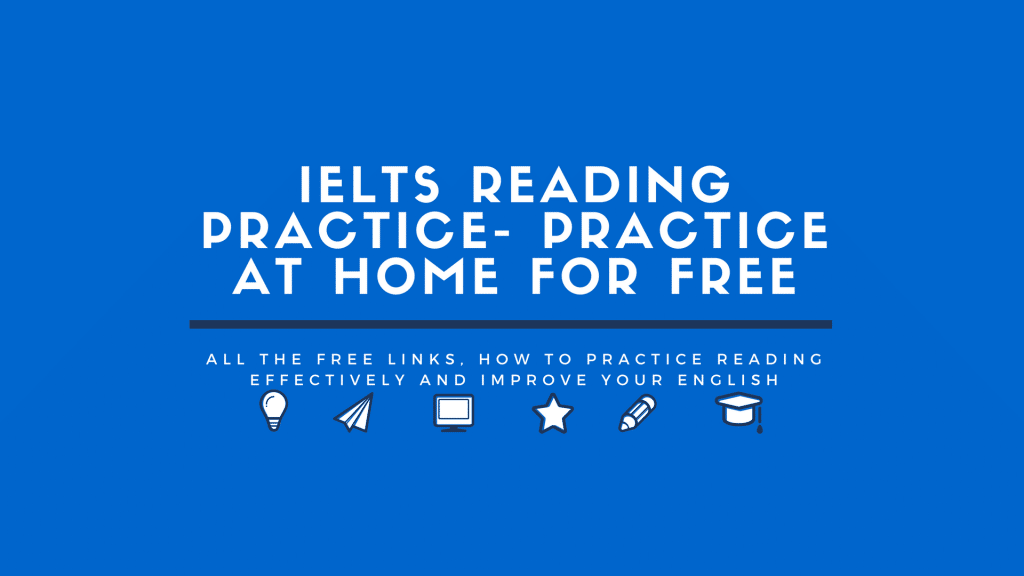IELTS reading practice tests are freely available on the internet and you can also use any reading material to sharpen your reading skills before your IELTS test.
The most important thing is that you use real IELTS tests and that you know what you are doing when you are practicing.
This article will show you where to find real practice tests for free and also show you how to improve your practice sessions.
Real vs Fake IELTS Reading Practice Tests
NEVER use fake tests. They are a complete waste of time.
Nearly all of the IELTS practice tests you find on the internet are fake. Using fake tests causes a huge amount of confusion and also leads to students having a completely false sense of what they are going to get on the real test.
How can you spot a fake test? If they are not produced by the Official IELTS Partners (Cambridge, IDP and the British Council) they are not to be trusted.
Real IELTS Reading Practice Tests
Here are links to all of the free IELTS reading practice tests that you can trust:
Books with Real IELTS Reading Practice Tests
The following books are also a great resource for anyone wanting to practice their IELTS reading skills:
Official IELTS Practice Materials
Don’t Just Use IELTS Reading Practice Tests
Doing lots of practice tests will only get you so far. It is incredibly boring to just do test after test and you can improve your reading skills by reading anything in English, not just IELTS tests.
It is a much better idea to read something you enjoy reading. The key here is consistency. It is much better to read a little every day than it is to cram a week before your test.
Reading a little every day will help improve not only your reading skills but also your:
- Vocabulary
- Grammar
- Idea generation
- Idea development
- Coherence and cohesion of your writing
- Your general level of English
The most effective way I have found to ensure that students read consistently is to encourage them to read something they are interested in.
So if you like current affairs, read the news every day. If you like cricket, read about your favorite team and players. Interested in travel? Read about the places in the world you want to go.
The important thing is not what you read, rather the fact that you are reading consistently. You might think that reading about something you enjoy is not going to help you improve, but trust me. If you read actively, like I am going to show you next, it is going to dramatically improve everything.
Active IELTS Reading Practice
If you really want to maximise the time you spend on reading, you must learn how to read actively.
Most people are passive readers. They read the words, but apart from that, they don’t really do anything while they are reading. If you want to improve your IELTS scores, you have to stop being a passive reader and start actively reading.
On a very basic level, actively reading means that you are doing something while you are reading. There are many things you can focus on, but let me highlight some things you could do to take your IELTS reading practice to the next level.
Vocabulary
- When you see a new word or phrase you don’t know, underline it.
- Guess the meaning from context.
- Note the word or phrase down in a vocabulary notebook.
- Add things to it that will help you remember it and use it properly, such as, meaning, pronunciation, collocations, synonyms and example sentences.
- Review your vocabulary book regularly.
- Add the new word to your active vocabulary by using it in a sentence.
Grammar
- Underline any grammar structures that look strange or that you don’t understand.
- Try to figure out why the author used that structure from context.
- Look up the grammar structure in a grammar book or google it.
- Try to use the grammar structure in a sentence of your own.
Idea Development
- When the author introduces a new idea, note how they develop that idea.
- How do they develop ideas?
- Note their explanations and use of examples.
Coherence and Cohesion
- How does the author make their message clear and easy to understand.
- Note their use of introductions, main body paragraphs and conclusions.
- Note their use of topic sentences, explanations and examples.
- Note their use of cohesive devices or linking words.
- Note these down and try to use them in your own writing, if appropriate.
Free Reading Material
It is surprising how many students ask me where they can find free sources of reading material. The answer is always ‘google it.’ You can literally search for any topic you are interested in and you will find hundreds of blogs and articles for free. If you found this website, you can find something else to read that you are interested in.
Next Steps
For more help with reading, check out our IELTS Reading page. You can also stay up to date with all of our free IELTS resources by liking our Facebook page.




